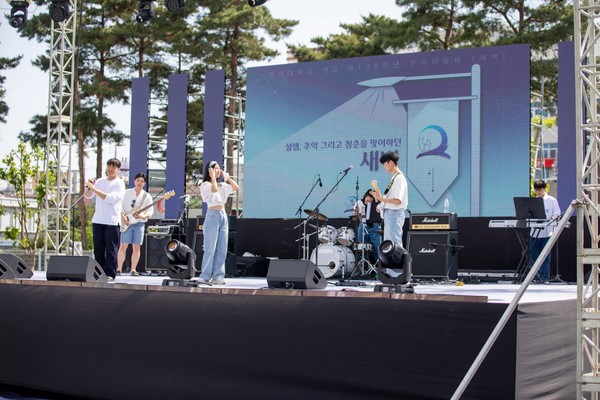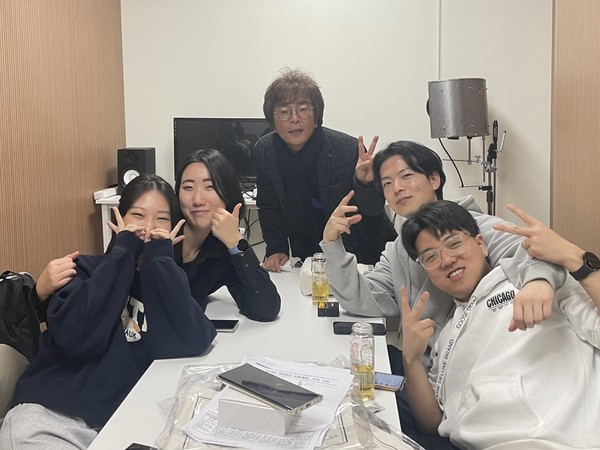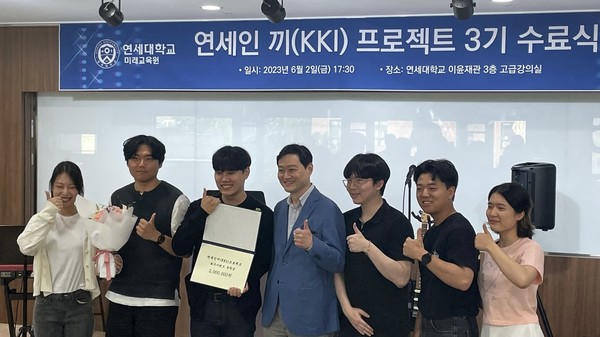Introducing the Yonseian KKI Project
YONSEI UNIVERSITY provides a multitude of opportunities, among which is the chance to discover one’s unique and creative voice. Sponsored by the Cortek Cultural Foundation and organized by Yonsei University’s Institute of Continuing Education for the Future, the Yonseian KKI Project invites undergraduate students of Yonsei University to explore and cultivate their own distinct rhythms of musical talent. The Yonsei Annals interviewed the Yonseian KKI Project’s director, Huh Hyeon-seung (Prof., School of Econ.), and head instructor, Yoo Jung-woo, to explore the program in depth.

Annals: Could you kindly introduce the Yonseian KKI Project?
Yoo: The Yonseian KKI Project is a musical training program that offers a variety of activities, from one-on-one free lessons with professional instructors to band performances. Cortek Cultural Foundation’s Chairman Park Young-ho, a prominent figure in the music and guitar industry and a fellow alumnus, founded this project in collaboration with the Institute of Continuing Education for the Future to encourage and support students to nurture their musical talent. Our goal is to provide quality lessons free of charge and great opportunities that will enhance competitiveness in individuals. The project is organized every semester and, thanks to the positive feedback we gained from our last three projects, we are now on our fourth Yonseian KKI Project.
Annals: How are the private lessons conducted and what kind of training is covered?
Yoo: When applying to the Yonseian KKI Project, students choose their focus out of six parts: music composition, vocals, keyboard, guitar, bass guitar, and drums. We have professional instructors for each part and each instructor is usually responsible for three students. Every student gets 2 hours of individual lessons weekly for 12 weeks, and each lesson consists of an hour of theory and an hour of practice. Although we have a common syllabus, the level at which each student is varies hugely. Thus, the instructors adjust the lesson plans accordingly to suit every trainee. We also have an in-depth course for students who have joined the Yonseian KKI Project for the second time.

Annals: You mentioned a band performance earlier. Could you tell us more about it?
Yoo: We do multiple band ensembles, from busking performances in Sinchon or Hongdae to music festivals in Yonsei. We want to offer as many on-stage experiences to students as possible so that they can improve their performance skills. Last semester, our bands played at Dae-dong-jae[1] in May and this semester, two of our bands will join the Cheong-song Music Festival. The event is scheduled for September 21 in Cheongsongdae Park with guest performers like MeloMance and BewhY.
Annals: How are the bands formed?
Yoo: There are no fixed rules on how the bands are formed. We try to have at least one student from each part for a balanced team, but there can be one or two overlapping positions. Normally, we appoint two team heads and divide students into Team A and Team B quite early in the program before assigning instructors who overlook band practices throughout the semester. Though instructors are there to help, the students are the ones who actively lead the band practices and decide the songs to perform. Sometimes, students bring their own original pieces too.
Annals: Compared to other band clubs or music lessons, what makes the Yonseian KKI Project stand out?
Yoo: It is not an everyday opportunity to be able to learn from the best in the industry for free. There are scholarships given for outstanding band performances, additional scholarships for the project head and deputy head, and a certificate once you complete the course. During the program, students are welcome to use the practice rooms in Lee Youn Jae Hall—named after alumnus Lee Youn-jae (Class of ’75, Dept. of Political Science & Int. Studies) who is also a generous sponsor of our program—on Sinchon campus. Also, our project is not limited to lessons and performances; we also teach students how to produce an album and release music. I would say the Yonseian KKI Project is closer to an agency than a club.
Annals: What are some of your favorite memories of the Yonseian KKI Project?
Yoo: Jang Young-hwan (Sr., Dept. of Computer Science), a student who participated in last semester’s project, comes to mind. I am also the music composition instructor for the Yonseian KKI Project, and Jang Young-hwan was one of my five students last semester. He said that he wanted to produce his own album, so I guided him through the process. It is not easy to complete an album within a semester—merely four months—but he did it. I was impressed by how determined and hard-working he was that I did him a personal favor—I asked my acquaintance from the Berklee College of Music to do the audio mixing[2] for the album for free. It was a rewarding experience for me and you can now stream Jang Young-hwan’s single on music platforms.
Annals: Could you tell us about the audition process?
Yoo: There are two steps in the application process. The first step is to submit an application and consent form—which can be found on the Institute of Continuing Education for the Future webpage—and a five-minute audition tape through email. The audition tape is a performance video of the applicant’s chosen instrument—either vocals, keyboard, guitar, bass guitar, or drums. For music composition applicants, the audition tape must be an original song piece and they submit an additional portfolio that details the production process of the piece. The second step is to upload the audition tape on YouTube. Instructors then assess the application forms and audition tapes thoroughly, while also considering the number of views and likes on their YouTube videos. It is not a popularity test but videos with, for instance, millions of views and likes are not something to overlook. The number of students accepted per position is generally 2 to 3, but this is subject to change depending on the applicants; we occasionally offer spots for applicants who fall just shy of acceptance. More details can be found on the Institute of Continuing Education for the Future notice board.

Annals: Do you have any last words for prospective applicants?
Yoo: We are now living in an era where having multiple jobs is not uncommon and personal branding matters. I believe the key to a fun life is not to limit yourself to a single role but to expand your diversity. The Yonseian KKI Project is one way to do so. I started my career as a music composer but now I am also a music professor and the Chief Executive Officer (CEO) of my own music entertainment company. The stability I gained as a professor did not stop me from accomplishing various goals in my life and that is what allows me to enjoy my life. You may have a primary goal in your life, but you should also have other smaller dreams. Do not give up on those dreams; little saplings will eventually turn into a forest.
Huh: The Yonseian KKI Project began with Chairman Park’s special fondness and support for applied music and Yonsei University students. So far, a total of 53 students have completed this nation's best applied music education program and more will join this crew after our fourth project. The Yonseian KKI Project has established itself as a representative student education program of Yonsei University through ceaseless efforts and continuous participation in activities such as performances in important school events, music competitions, and busking performances on campus. In the future, the importance of adapting to change and demonstrating original talent will be greater than ever. I hope more students will participate in this rare experience of fully exhibiting their potential and dreaming of a new future.
[1] Dae-dong-jae: Yonsei University’s annual festival preceding AKARAKA
[2] Audio mixing: A process in sound recording and reproduction that optimizes and combines multitrack recordings into a final sound product

